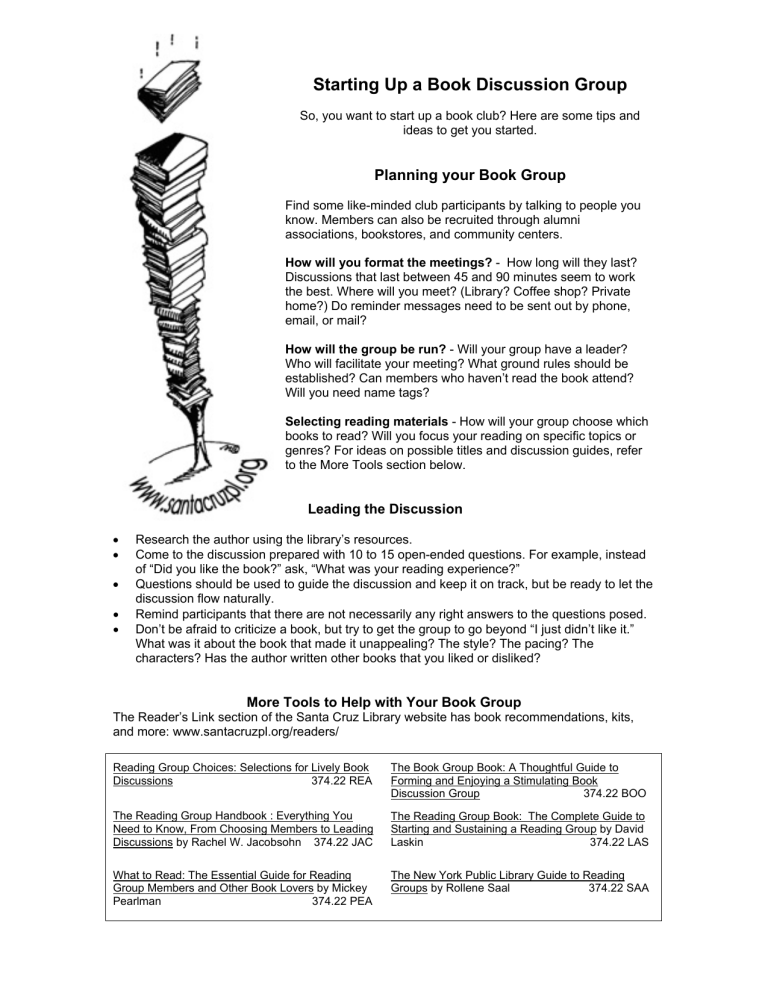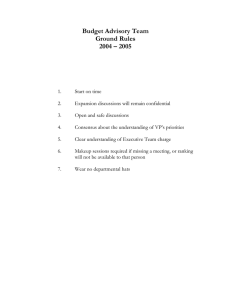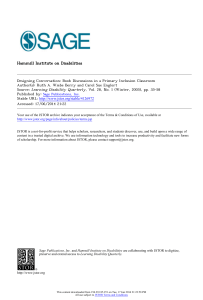Starting Up a Book Discussion Group

Starting Up a Book Discussion Group
So, you want to start up a book club? Here are some tips and ideas to get you started.
Planning your Book Group
Find some like-minded club participants by talking to people you know. Members can also be recruited through alumni associations, bookstores, and community centers.
How will you format the meetings?
- How long will they last?
Discussions that last between 45 and 90 minutes seem to work the best. Where will you meet? (Library? Coffee shop? Private home?) Do reminder messages need to be sent out by phone, email, or mail?
How will the group be run?
- Will your group have a leader?
Who will facilitate your meeting? What ground rules should be established? Can members who haven’t read the book attend?
Will you need name tags?
Selecting reading materials - How will your group choose which books to read? Will you focus your reading on specific topics or genres? For ideas on possible titles and discussion guides, refer to the More Tools section below.
Leading the Discussion
•
Research the author using the library’s resources.
•
Come to the discussion prepared with 10 to 15 open-ended questions. For example, instead of “Did you like the book?” ask, “What was your reading experience?”
•
Questions should be used to guide the discussion and keep it on track, but be ready to let the discussion flow naturally.
•
Remind participants that there are not necessarily any right answers to the questions posed.
•
Don’t be afraid to criticize a book, but try to get the group to go beyond “I just didn’t like it.”
What was it about the book that made it unappealing? The style? The pacing? The characters? Has the author written other books that you liked or disliked?
More Tools to Help with Your Book Group
The Reader’s Link section of the Santa Cruz Library website has book recommendations, kits, and more: www.santacruzpl.org/readers/
Reading Group Choices: Selections for Lively Book
Discussions 374.22 REA
The Book Group Book: A Thoughtful Guide to
Forming and Enjoying a Stimulating Book
Discussion Group 374.22 BOO
The Reading Group Handbook : Everything You
Need to Know, From Choosing Members to Leading
Discussions by Rachel W. Jacobsohn 374.22 JAC
The Reading Group Book: The Complete Guide to
Starting and Sustaining a Reading Group by David
Laskin 374.22 LAS
What to Read: The Essential Guide for Reading
Group Members and Other Book Lovers by Mickey
Pearlman 374.22 PEA
The New York Public Library Guide to Reading
Groups by Rollene Saal 374.22 SAA
Suggestions for Participants
SPEAK UP! Group discussion is like a conversation; everyone takes part in it. The discussion is a spontaneous exchange of ideas and opinions, rather than a group of prepared statements. What you think is important, and this is your chance to say it!
LISTEN thoughtfully to others! Try to understand the other person’s point of view. Remember that there are several points of view possible on every question.
BE BRIEF! Share the discussion with others. Speak for only a few minutes at a time, and make your point in as few words as possible. Be ready to let someone else speak. A good discussion keeps everyone in the conversation.
SHARE YOUR VIEWPOINT AND EXPERIENCE! Don’t expect to be called on to speak; enter into the discussion with your comments of agreement or disagreement. When you find yourself disagreeing with other people’s interpretations or opinions, say so and tell why, in a friendly way.
Considering all points of view is important to group discussions.
COME WITH YOUR OWN QUESTIONS in mind. As you read, make note of the points on which you’d like to hear the comments of group members.
Reading Critically
Reading for a book discussion differs somewhat from reading purely for pleasure. Here are some suggestions for how to approach a critical read:
•
Make notes as you go. As you read a book in preparation for a discussion, ask questions of yourself, and mark down pages you might want to refer back to.
•
Ask tough questions of yourself and the book.
•
Pay attention to the author’s message. Remember that a good author uses every word in a text deliberately. Try to be aware of what the author is revealing about herself and what she wants you to learn about life from her perspective.
Reading Discussion Points
•
What makes this book distinctive?
•
What is the writing style of the author?
•
How did the characters and plot make you feel?
•
Did you notice any symbolism or underlying themes?
•
Is the period in which the book is set important to the theme? What values are presented by the book's author?
•
Is the setting of the book important to the theme? Why?
•
What did the author attempt to do in the book? Was he or she successful?
•
Compare the book to others by the same author or to books by other authors that have a similar theme or style.
•
Would this book make a good movie? Why or why not?

